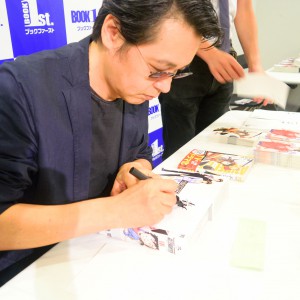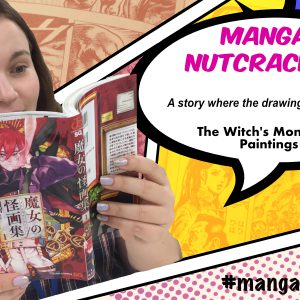
Are four heads better than one?? With roots in fan-made fiction, Clamp have lit up the world of manga with a universe of magic, tragedy and above all, love. But in an industry famous (or infamous) for grueling workloads, handled by a single creative mind, does a creative collective work? This week, I bow down to the undisputed Queens of Shōjo!
Name: Clamp (クランプ Kuranpu)
Founded: 1987
Current members: Nanase Ohkawa, Mokona, Tsubaki Nekoi, Satsuki Igarashi
Speciality: The Queens of Shōjo

ABOUT
Formed in the mid 80’s as “Clamp Cluster”, the group of 11 Osaka women formed a manga collective to create doujinshi (fan-made manga), honoring Captain Tsubasa and Saint Seiya, amongst others. By 1987, Clamp, including mainstays Mokona, the sole illustrator and lead writer Ohkawa decided to channel their efforts into an original piece, starting work on RG Veda soon after.
By the group’s professional debut in 1989, Clamp had downsized considerably. Their work caught the attention of Shinshokan’s Wings manga magazine, but the 60 page story sample they submitted failed to impress the editors. Undaunted and learning from their mistakes, the group dusted off RG Veda and secured themselves a series in Wings. It was during this time that the majority of the group left, leaving behind the core members who would steer Clamp to undreamed of success.
With RG Veda ever under the axe, should popularity waver, Clamp upped their creative output and kicked off several series, with several publishers. With an abundance of titles, including Man of Many Faces, Duklyon: Clamp School Defenders, X, Miyuki-chan in Wonderland and Magic Knight Rayearth, the 1990’s not only became a decade of prolific creativity for the group, it also established Clamp as manga voice to be reckoned with, not least with the arrival of the much loved Cardcaptor Sakura.
15 years into the group, the remaining members of Clamp decided to change their names. In true “rock star” fashion, Nanase Ohkawa, Mokona Apapa, Mick Nekoi, and Satsuki Igarashi were now known as Ageha Ohkawa, Mokona, Tsubaki Nekoi and Satsuki Igarashi, respectively. Indeed, Tsubaki ‘Mick’ Nekoi’s reason was to avoid any confusion with British Rolling Stone, Mick Jagger!
Identity crisis aside, Clamp were now a worldwide phenomenon. With requests for event appearances coming in from all over the world and 90 million copies sold, the ‘manga hobbyists’ from Osaka embarked on more daring story concepts. xxxHolic for Young Magazine and Tsubasa: Reservoir Chronicle, serialized in the Weekly Shōnen Magazine were two independent stories that made up a single, interconnecting story arch. With Tsubasa aimed at a young, male audience, the “Queens of Shōjo” were gambling with concepts, hitherto unknown in manga with ease.
More recently, Clamp have revisited these two defining titles. XXXHOLiC Rei and Cardcaptor Sakura: Clear Card are both sequels that seamlessly continue the stories, yet introduce new and exciting characters for the world’s Clamp hungry fandom. If Clamp have learned anything from the Rolling Stones, it’s to make sure their fans get “Satisfaction”!

MY THOUGHTS
Stepping into Clamp’s universe for the first time is daunting to say the least. It’s huge! From magic spells to inter-dimensional hopping, via cloning, the stories created by the group seem to be small parts of a much bigger picture. Birthing, growing and maintaining a universe as big as Clamp’s can be both immensely rewarding and a veritable nightmare (just ask R.R. Martin, J.R.R. Tolkien and George Lucas!), so how do the “Queens of Shōjo” manage to pull it off? Or do they??
Clamp are at their best when crafting characters. In fact, it’s the characters that seem to keep this burgeoning behemoth under control, particularly in how they utilize them. Taking a leaf from the great God of Manga himself, Osamu Tezuka, the group see their characters more like actors than a specific creation for a specific story. Take the mild mannered, ever kawaii Sakura Kinomoto, appearing in both Cardcaptor Sakura and Tsubasa RESERVoir CHRoNiCLE. Though she appears in slightly differing roles, this ‘recycling’ of a character not only allows a sense of familiarity to new stories, it helps to cement the stories in the universe as a whole.
But building such a huge universe is also fraught with many difficulties, not least keeping track of their characters! With so many ‘actors’ at their disposal, the group have taken to writing up ‘résumés’ to help them avoid making any glaring errors! Indeed, with a fanbase as big as Clamp’s, the smallest mistake in one of their beloved characters would be instantly picked up, potentially cracking the illusion of entertainment the group strives so hard to create.
The margin for error doesn’t stop at characters bios either. With such a big universe, inhabited by an even bigger cast, the potential for creating ‘loose plot threads’ is so high that they’ve become inevitable. From delayed satisfaction with dragging out mysteries to seemingly abandoning a story arc altogether, Clamp have garnered as much frustration as adoration. But with a loyal fanbase, ready to forgive almost anything, this particular idiosyncrasy of Clamp has become more endearing than annoying.
At its very core, Clamp are a group of fans making manga for fans. With roots firmly planted in doujinshi culture, the group prefer to shy away from the title ‘mangaka’, explaining that they are here by pure chance. It’s this element that has garnered a fanbase that spans continents and generations, simply because they are one of us. We easily forgive mistakes, and eagerly applaud success because they speak to us on a personal level from their own experience. Clamp are a movement that both gives the fans what they want, and leaves them wanting more. Surely, the mark of great entertainers.
MANGA
1989 – 1996 RG Veda
1990 – 1991 Man of Many Faces
1990 – 1993 Tokyo Babylon
1992 – 1993 Clamp School Detectives
1992 – 1993 Duklyon: Clamp School Defenders
1992 – 1992 Shirahime-Syo: Snow Goddess Tales
1992 – 2003 X/1999
1992 – 1994 Legend of Chun Hyang
1993 – 1995 Magic Knight Rayearth
1993 – 1995 Miyuki-chan in Wonderland
1995 – 1995 The One I Love
1995 – 1996 Magic Knight Rayearth
1996 – 2000 Cardcaptor Sakura
1996 – 1998 Wish Kadokawa
1997 – 1999 Clover
1999 – 2001 Angelic Layer
1999 – 2000 Suki: A Like Story
2000 – 2003 Legal Drug
2001 – 2002 Chobits
2002 – 2002 Murikuri
2003 – 2011 xxxHolic
2003 – 2009 Tsubasa: Reservoir Chronicle
2005 – 2011 Kobato
2011 – Gate 7
2011 – Drug & Drop
2013 – xxxHolic: Rei
2014 – 2016 Tsubasa World Chronicle: Nirai Kanai-hen
2016 – Cardcaptor Sakura: Clear Card
NEXT WEEK: Tetsuo HaraChris


















